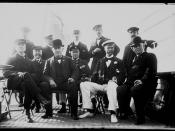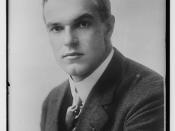Fern Hill, Or: Nothing Green Can Stay
"Fern Hill" is a touching and sad reminiscence of Dylan Thomas' childhood, as well as a wistful lament on one of man's saddest and most inevitable woes: the loss of innocence. Thomas describes the farm as if he were a young boy again, feeling and experiencing again the same magical moments that filled his childhood. The poem is filled with the imaginative fantasies of a little boy - he was the "prince of the apple towns," and he was "honored among wagons" and "famous among barns." Such fanciful and happy memories pervaded Thomas' mind as he wrote of those glorious days when nothing could go wrong and there were no worries.
Thomas is so taken by and in love with Fern Hill that he speaks of it in a religious way: the poem is filled with Christian imagery. He essentially compares the farm to the Garden of Eden: amongst the apple trees and holy streams, Fern Hill was the maiden to Thomas' Adam, young and innocent.
It would seem that Thomas does not call Fern Hill "Eve" because that would imply that it, too, would fall from grace eventually. Rather, the farm is an unchanging symbol of innocence.
Throughout the poem, images of green, gold, and white abound; Thomas uses these most vivid and fond colors from his boyhood memories as symbols for various spiritual aspects of a young child. Green is the symbol for happiness - he was happy as the grass was green, and he joyously played about the fire, which was also green as grass. Dylan Thomas and Robert Frost both identified youth with gold, evidently from the presence of gold in nature, in young plants particularly. More religious imagery is used in describing innocence itself,


